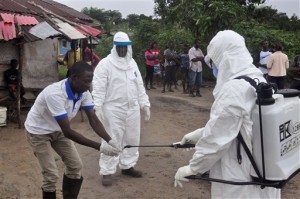
Health workers wash their hands after taking a blood specimen from a child to test for the Ebola virus in an area where a 17-year old boy died from the virus on the outskirts of Monrovia, Liberia, Tuesday, June 30, 2015. Liberian authorities on Tuesday quarantined the area where the corpse of the boy was found, sparking fears this West African country could face another outbreak of the disease nearly two months after being declared Ebola-free. AP FILE PHOTO
MIAMI — The first vaccine against Ebola that patients can inhale instead of inject has shown promise in tests on monkeys and should move into human trials soon, researchers said Monday.
The study in Journal of Clinical Investigation was led by researchers at the University of Texas Medical Branch at Galveston and the US National Institutes of Health.
If found to work in people, scientists said the vaccine could be useful in crisis situations or remote areas where it is difficult to find trained medical personnel to administer vaccines.
A weakened version of the virus, called parainfluenza virus type 3 (HPIV3), was engineered to contain an Ebola virus glycoprotein in order to stimulate an immune response against Ebola.
HPIV3 is a common cause of respiratory tract infections in young children.
Researchers gave the vaccine to rhesus macaques by placing a nebulizer mask over their faces, delivering the vaccine into their noses and mouths.
Next, when the vaccinated animals were injected with what would normally be a lethal dose of Ebola virus, they survived.
The animals showed no ill side effects from the vaccine, known for now as HPIV3/EboGP, according to senior author Alex Bukreyev, professor of virology at the University of Texas Medical Branch, Galveston.
“This study demonstrates successful aerosol vaccination against a viral hemorrhagic fever for the first time,” he said.
Other Ebola vaccines are currently being tested, but they are delivered by injection.
Bukreyev and colleagues compared the aerosol vaccine to an unrelated injectable vaccine, and found that although both protect macaques, they induced very different types of the immune response.
There is no vaccine on the market to prevent Ebola. More study is needed to determine which kinds of vaccines may be most effective.
Ebola spread quickly across West Africa beginning in late 2013 and ballooned into the deadliest outbreak in history.
“A needle-free, inhalable vaccine against Ebola presents certain advantages,” said lead author Michelle Meyer, University of Texas Medical Branch postdoctoral fellow in the department of pathology.
“Immunization will not require trained medical personnel.”
Researchers hope their vaccine will soon move into a phase I clinical trial in people.
According to infectious disease expert Jesse Goodman, a professor of medicine at Georgetown University Medical Center, the study is “important” and “well-done.”
Goodman, who was not involved in the research, agreed with the study authors that an inhalable vaccine could make administering medicine easier in remote locations and in times of crisis, and could help avoid the problem of needle disposal.
“For these reasons, this vaccine is a welcome addition to others currently under study,” he told AFP in an email.
He said studies on humans are needed in order “to determine if the anti-Ebola immune response in adult humans, in whom PIV3 infection is frequent during childhood, will be as robust as seen in the non-human primates, or whether it may be reduced in some individuals due to preexisting immunity against PIV3.”
RELATED STORIES
UN envoy: Expect Ebola vaccine in coming months
WHO eyes mass Ebola vaccines by mid-2015